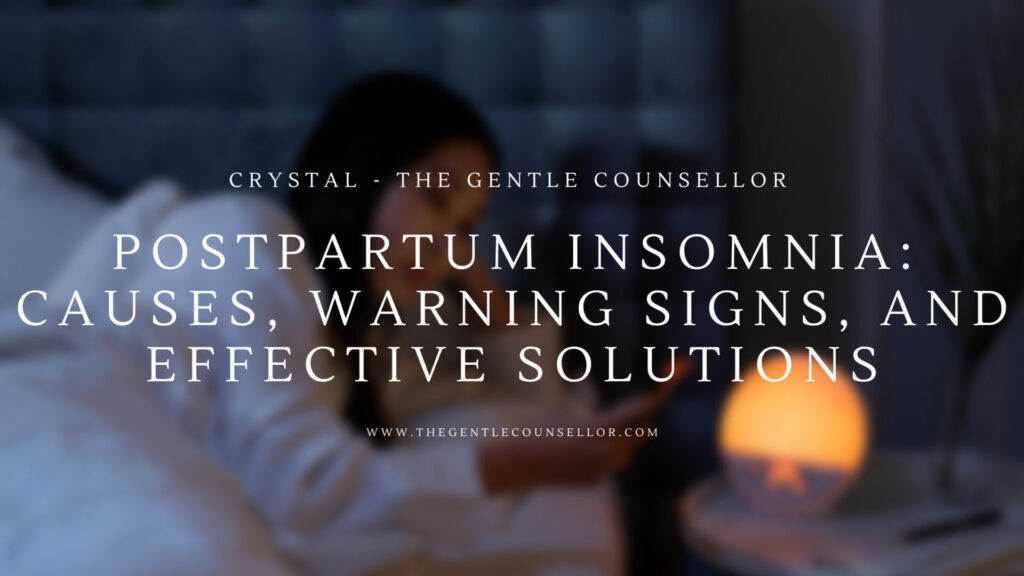
Postpartum Insomnia: Causes, Warning Signs, and Effective Solutions for New Mothers
Learn about postpartum insomnia, its warning signs, and effective solutions for new mothers in this comprehensive blog post. Speak to a healthcare provider for help and get the rest you need to take care of yourself and your baby.
Becoming a new parent is a life-changing experience that comes with its own set of challenges, one of which is postpartum insomnia. Sleep deprivation is a common issue for new parents, but postpartum insomnia goes beyond just feeling tired. It can lead to chronic sleep deprivation, which can affect your physical and mental health. In this blog post, we will discuss what postpartum insomnia is, its warning signs, who to see for help, and some suggestions for improving sleep and fixing insomnia.
What is postpartum insomnia?
Postpartum insomnia is a type of sleep disorder that affects new mothers, typically within the first few months after giving birth. It is characterized by difficulty falling or staying asleep, even when the baby is sleeping. This type of insomnia can be caused by several factors, including hormonal changes, stress, anxiety, depression, or physical discomfort.
Warning signs of postpartum insomnia:
It's normal to experience some sleep deprivation when you have a new baby, but if you're experiencing the following symptoms, it's time to talk to a healthcare provider about postpartum insomnia:
- Difficulty falling asleep or staying asleep, even when the baby is sleeping
- Feeling exhausted, but unable to sleep
- Waking up frequently during the night
- Feeling anxious or depressed
- Having difficulty concentrating or remembering things
- Feeling irritable or moody
- Difficulty performing daily activities
Who to see for help:
If you are experiencing symptoms of postpartum insomnia, it's important to speak with your healthcare provider. They can help determine the cause of your insomnia and recommend appropriate treatment. A healthcare provider may refer you to a sleep specialist or a mental health professional, depending on the cause of your insomnia.
Suggestions for improving sleep and fixing insomnia:
Make sure to listen to the Podcast episode above because my guest, Allison, shares her experience with anxiety and insomnia and how she found success with sleep from a place of acceptance and compassion, rather than treating it as a problem to solve.
Accepting insomnia as a part of your experience:
Insomnia can be frustrating and exhausting, but it's important to acknowledge that it's a part of your experience. By accepting that you're struggling with insomnia, you're not denying or avoiding it. Instead, you're acknowledging it as a part of your life and learning to live with it. This acceptance can help you reduce the stress and anxiety that often accompany insomnia.
Compassionate self-talk:
One way to approach insomnia with compassion is through self-talk. Instead of berating yourself for not being able to sleep, try talking to yourself with kindness and compassion. You can try phrases like:
-
"It's okay to not sleep well sometimes."
-
"I'm doing the best I can."
-
"I'm taking steps to improve my sleep."
By using compassionate self-talk, you're shifting your mindset from frustration to acceptance and self-care.
CBT strategies for managing insomnia:
Cognitive Behavioral Therapy (CBT) is a type of therapy that can be helpful in managing insomnia. Here are some CBT strategies you can try:
- Sleep hygiene: Establish a regular sleep schedule, create a relaxing sleep environment, avoid napping during the day, and limit caffeine and alcohol intake.
- Stimulus control: Associate your bed with sleep and avoid activities like watching TV or working in bed.
- Relaxation techniques: Practice relaxation techniques like deep breathing, meditation, or progressive muscle relaxation to calm your mind and body.
- Cognitive restructuring: Challenge negative thoughts and beliefs that contribute to anxiety or stress around sleep. Reframe your thoughts to focus on positive aspects of your sleep and prioritise rest.
ACT strategies for managing insomnia:
Acceptance and Commitment Therapy (ACT) is a type of therapy that can be helpful in managing insomnia. Here are some ACT strategies you can try:
- Mindfulness: Mindfulness can help you become more aware of your thoughts and emotions around sleep. By practicing mindfulness, you can learn to observe your thoughts without getting caught up in them.
- Values clarification: Clarifying your values around sleep can help you stay motivated to make changes that improve your sleep. Ask yourself what's important to you about sleep and how it aligns with your goals and values.
- Defusion: Defusion involves stepping back from your thoughts and recognizing that they're not always true or helpful. By defusing from negative thoughts or beliefs around sleep, you can reduce their impact on your mood and behavior.
- Committed action: Committed action involves taking steps towards your goals, even if it's uncomfortable or difficult. By committing to changes that improve your sleep, you can start to make progress towards better rest.
Conclusion:
Insomnia can be a challenging experience, but by approaching it with acceptance and compassion, you can reduce the stress and anxiety that often accompany it. Incorporating CBT strategies like sleep hygiene, stimulus control, relaxation techniques, and cognitive restructuring can help manage insomnia and improve the quality of your sleep. Incorporating Acceptance and Commitment Therapy (ACT) strategies like mindfulness, values clarification, defusion, and committed action can help manage insomnia and improve the quality of your sleep. Remember to be kind to yourself and prioritize rest, and seek help from a healthcare provider or therapist if necessary.
Need someone to talk to? Book a Counselling session with me.
Crystal Hardstaff provides individual and couple counselling. She specialises in Trauma, Attachment Theory, Perinatal Mental Health and Parenting Support.